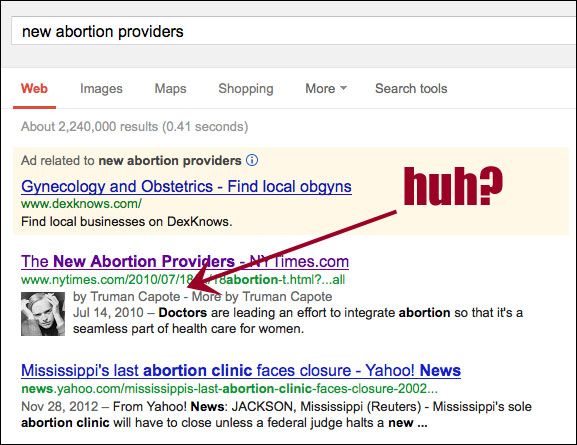Google’s Authorship Fail: How Truman Capote Was Credited As A NYT Writer 28 Years After His Death
If you happened to do certain abortion-related searches in the past few days, you might’ve been surprised to see the late Truman Capote getting Google+ Authorship credit for an article from The New York Times. What makes it odd, of course, is that Capote died in 1984. He wrote numerous classics that showed up on […]

What makes it odd, of course, is that Capote died in 1984. He wrote numerous classics that showed up on the Times bestseller list but, as far as I know, he never actually wrote for the Times itself — and he certainly didn’t write an article that was first published in 2010.
Capote also died a couple decades too soon to have a Google+ account, which makes this search result — shared with us by Times columnist Noam Cohen — all the more unusual.
Famed writer Truman Capote is getting Google+ Authorship credit on that article.
So, how’d it happen? Let’s unravel it a bit and see how Google’s aggressive efforts to associate web content with Google+ accounts can sometimes go very wrong.
About That New York Times Article
The New York Times published an article called The New Abortion Providers on July 14, 2010.
The author is listed as Emily Bazelon, and a quick Google search tells us that she’s a senior editor for Slate and a Times contributor. She has a Wikipedia page and a Knowledge Graph box, but the Knowledge Graph doesn’t connect to her Google+ account, perhaps because
- her account is essentially inactive, and
- it doesn’t connect to any of her online writings using Google’s authorship guidelines
There’s no mention of Truman Capote in the article itself, but at the end of it there’s this:
It’s the only mention on the page of Capote’s name: “Emily Bazelon, a contributing writer, is a senior editor at Slate and the Truman Capote law-and-media fellow at Yale Law School.”
Is that enough to connect Bazelon’s article to a long-deceased author? Yes, when someone has also made a Google+ account for said author.
Truman Capote on Google+
Though he’s been dead for almost 30 years, Truman Capote has a Google+ page. Don’t know who created it or when, but there it is. (UPDATE, 4:10 pm: Google has deleted the Truman Capote page on Google+; that link above now leads to a 404 error.)
It also has no signs of Google Authorship — there’s no fake mention that Capote was a Times writer or anything like that. It doesn’t really mention anything about Capote’s writings.
So what we have is a case of Google being overly aggressive in looking to connect online content (the NYT article) with a Google+ account. It’s similar to what AJ Kohn discovered a couple months ago, when Google was correctly tying my own Marketing Land articles to my Google+ account, even though I hadn’t yet added my Marketing Land author page in my account settings.
But, in this case, Google is ignoring Bazelon’s Google+ account and instead connecting it to the Truman Capote page, all based on a single mention in the author’s bio at the end of the article.
Google’s Algorithmic Authorship
Bottom line: Google isn’t relying solely on authors to setup Google+ Authorship, they’re creating authorship connections algorithmically. A Google spokesperson confirmed that for us in this statement, provided last night via email, when we alerted them to the Capote/NYT connection: (added emphasis is mine)
“We want to help users see who’s writing the content they find on the web and engage directly with authors. To that end, earlier this year we began algorithmically identifying authors in some cases. We still encourage authors to add explicit authorship markup and verify their email addresses to provide the most comprehensive and accurate data.”
This situation has now been fixed. If you search Google for the Times article, you won’t see Capote’s avatar and Google+ account connected to it. But as Google continues to try auto-associating articles and Google+ pages, it seems safe to assume we’ll see more cases like this one in the future.
It’s easy to blame Google for mistakes like this, but it wouldn’t have happened if the Times and the article’s author had correctly established an authorship connection. That’s the main takeaway for publishers: Setup authorship yourself, or risk Google trying to do it algorithmically, and getting it really wrong.
Contributing authors are invited to create content for Search Engine Land and are chosen for their expertise and contribution to the search community. Our contributors work under the oversight of the editorial staff and contributions are checked for quality and relevance to our readers. Search Engine Land is owned by Semrush. Contributor was not asked to make any direct or indirect mentions of Semrush. The opinions they express are their own.




